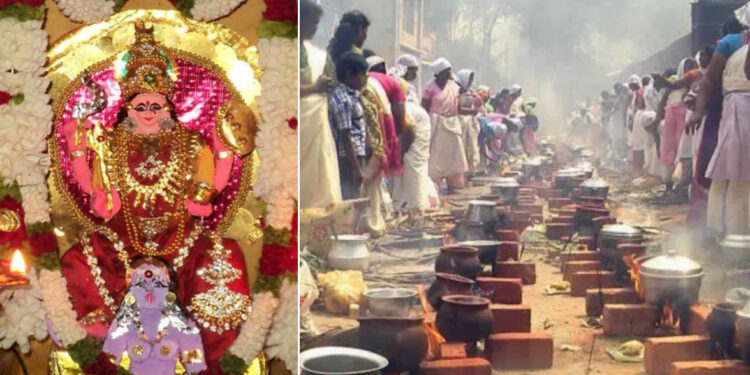Pongala is a traditional Hindu ritual that is celebrated annually in the Indian state of Kerala, particularly in the capital city of Thiruvananthapuram. The word ‘Pongala’ means ‘to boil over’ or ‘overflow’ in Malayalam, which is the local language of Kerala. The ritual involves cooking rice pudding in earthen pots and offering it to the presiding deity of the Attukal Bhagavathy Temple, which is dedicated to the Hindu goddess Bhagavathy. The story behind Pongala is both fascinating and inspiring.
Legend has it that the Attukal Bhagavathy Temple was once a sacred grove where the goddess Bhagavathy resided. However, the grove was gradually destroyed by human activities such as logging and encroachment. The goddess was deeply saddened by the destruction of her abode and decided to leave the place. However, before leaving, she appeared in the dream of a devotee named Kannagi and instructed her to perform a ritual to appease her.
Accordingly, Kannagi and a few other women cooked rice pudding in earthen pots and offered it to the goddess. To their surprise, the goddess appeared before them and blessed them with her divine presence. She also declared that henceforth, the Pongala ritual should be performed annually on the day of the Attukal Pongala festival, which falls in the Malayalam month of Kumbham (February-March).
Since then, the Pongala festival has become a major event in Kerala, attracting millions of women devotees from all over the state and beyond. The festival begins with the ritualistic cleansing of the temple premises and the surrounding area. The women devotees then gather around the temple and light traditional clay stoves made of mud and cow dung. They cook rice pudding, also called ‘pongal’ in Tamil, in earthen pots and offer it to the presiding deity of the temple.
What makes the Pongala festival unique is that it is entirely women-centric. Men are not allowed to participate in the ritual, and the entire process is managed and executed by women. This is because the goddess Bhagavathy is considered to be a feminine deity and is believed to be more accessible to women devotees. The Pongala festival is also significant in that it promotes social and cultural harmony, as women from all walks of life and different religions come together to participate in the ritual.
The story behind Pongala is a testament to the enduring power of faith and devotion. It also highlights the importance of environmental conservation and the need to protect our natural resources. The Pongala festival serves as a reminder that we must respect and cherish the environment that sustains us, just as the goddess Bhagavathy revered her sacred grove.



















Discussion about this post